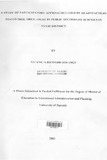| dc.description.abstract | Many secondary school head teachers have dealt with matters related to drug abuse among the students single handedly without involving the entire school community of teachers, students, boards of governors and parents. This style of management used by Head teachers may be one of the reasons why the menace of drugs has resulted into destructive riots, boycotts, sit-ins and unruly conduct that have resulted to loss of lives and destruction of school properties. The purpose of this study was to examine the participatory approaches used by head teachers to control drug abuse in public secondary schools in Nyeri District. The study also sought to identity the kinds of drugs abused by secondary school students, the sources of drugs abused, the causes of drug abuse among the students used to control drug abuse among the secondary school students. There were five hypotheses that were tested to establish if there were any significant difference between the participatory approaches used by headteachers and selected demographic variables; age, gender, administrative experience, professional grade of the heaclteachers and the size of school. Literature review was discussed under the following subtopics: introduction, the concept of participatory administration and its application on drug abuse control, democracy in administration and education administration, drug dependence and abuse as a global epidemic, drug abuse and discipline in Kenyan secondary schools, research findings related to the study, participatory approaches in the prevention of drug abuse in schools and other methods of preventing drug abuse. From the literature review, an integrated approach to drug abuse control and conceptual framework was designed. An ex-post facto design was selected for this study because it was not possible to manipulate the variables of the study like age, sex, academic qualifications, professional grade and experience of both head teachers and teachers and also the size of the school. The drug problems and attempted preventative approaches in secondary schools are directly linked in most of Kenyan secondary schools. Data pertaining to drug abuse and related discipline challenges faced by public secondary schools in Nyeri District was gathered using questionnaires. These questionnaires were also employed in gathering data on strategies used to control drug abuse in public secondary schools in the district. Research Findings The following are the findings of the research study: I. The most frequently suggested participatory methods of controlling drug abuse among the students were individual guidance and counselling of students, effective participation of provincial administration in controlling drug in schools and involving peer students guidance and counselling. 2. Findings from the study have shown that Head teachers irrespective of their age had no significant difference on their participatory approaches used to control drug abuse among the students. 3. The findings also indicated that no significant difference existed between the gender of head teacher and the participatory approaches used to control drug abuse among the students. Recommendations I. Frequent workshops and in-service courses for head teachers and heads of guidance and counselling be stepped up to train them professionally on how to involve others on drug abuse problems. 2. Involve parents on campaign against drug abuse and be guided and counselled on how to bring up their children in view of the current menace of drug abuse in the community. 3. The provincial administration to be fully involved by Head teachers in controlling drug abuse among the students in secondary schools. 4. Participatory approaches between schools and government to be encouraged so that very strict rules and guidelines would be enacted on drug peddlers and drug abusers both inside and outside the school community and application of drugs and Psychotropic Substances Act of 1994 to the letter. Suggestions for further research The following areas are suggested for further research. 1. A replication of this study using an interview schedule as research instrument with students and parents as respondents. 2. To conduct a comparative study on the use of participatory approaches used by Head teachers to control drug abuse in secondary schools in rural and pure urban area like Nairobi Province. 3. A study on the effects of drug abuse on the spread of HIV and AIDS in secondary schools. | en |

